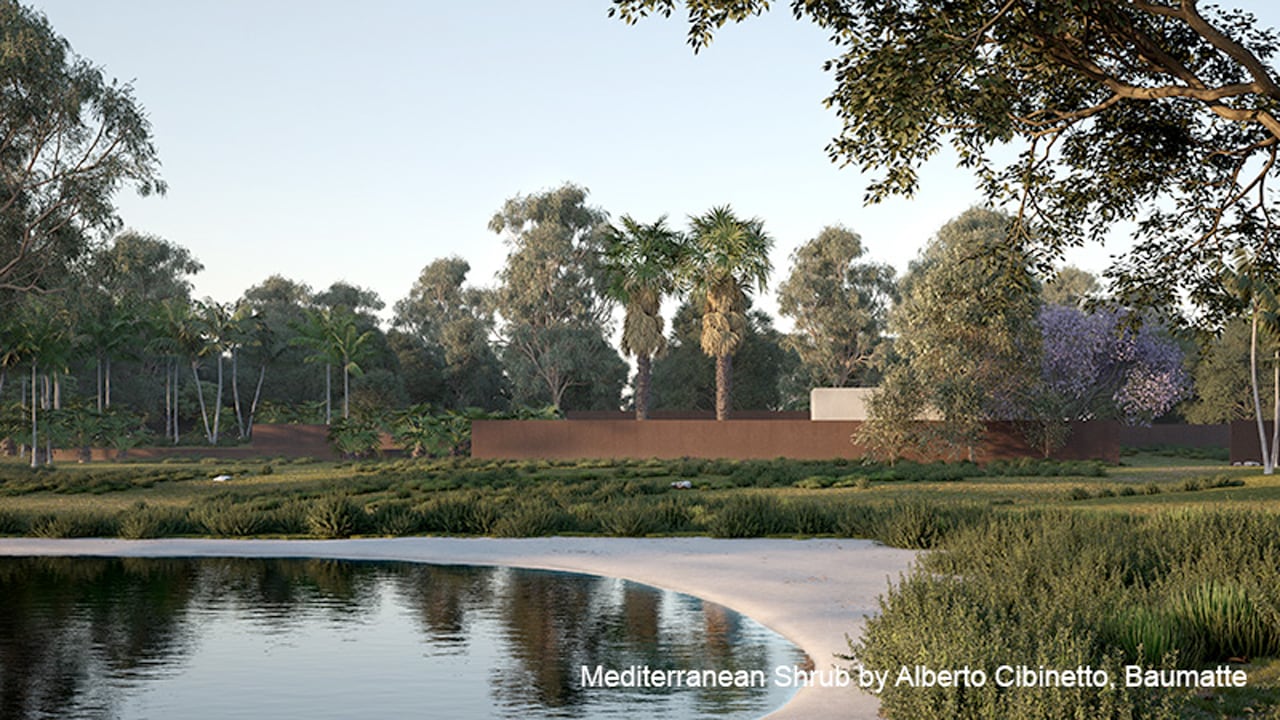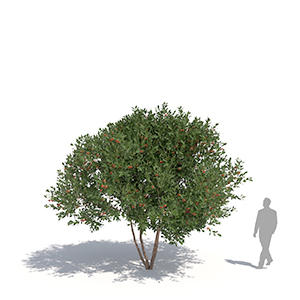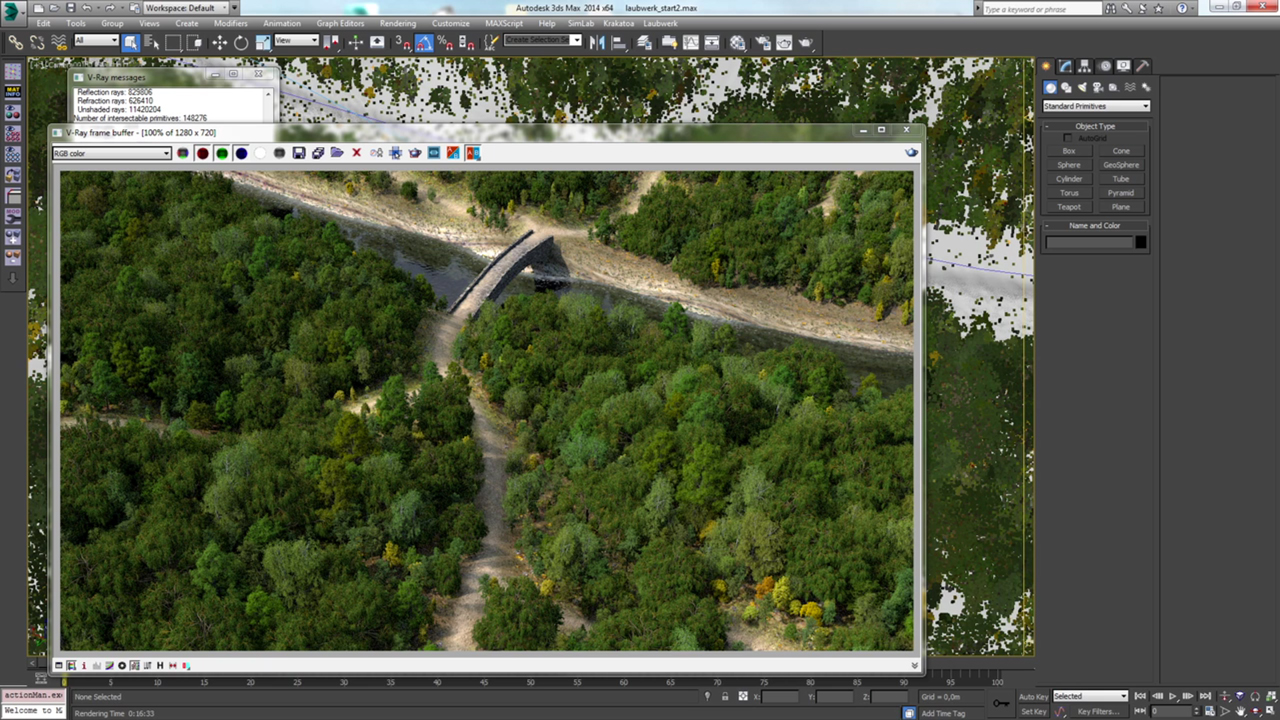1.0.48 Laubwerk Plants Kit 15 – Subtropical Trees and Palms
EDIT in Admin Edit in WP
Downloads
Download demos and trial versions, product documentation, free presets and more.
You may download a free Demo after logging in.

Subtropical Trees and Palms
An exclusive selection of subtropical trees and palms for special plantings in gardens and parks where a Mediterranean or exotic atmosphere is desired — such as the western strawberry tree, with its exotic strawberry-like fruit, or the dwarf palm, with its beautiful, fan-shaped leaves.
Subtropical Broadleaf Trees and Palms – 10 subtropical species in 3 variants, 3 ages and 4 seasons each, for architects and CG artists working in 3ds Max, Maya, Cinema 4D, and SketchUp.
3D Plants for CG Artists
Laubwerk offers easy-to-use software extensions for architects and CG artists looking for authentic 3D plants, and plant scattering tools.
With drag-and-drop simplicity, and easy-to-use tools that modify the shape, age, season and level of detail for each of Laubwerk’s stunning 3D plants, users can seamlessly add 3D trees to any CG project. For Autodesk 3ds Max & Maya, MAXON Cinema 4D, Trimble SketchUp, and Python.
Includes 360 Models
All Laubwerk Plants in this Kit come in 36 variations per species, i.e. 3 variants, 3 ages and 4 seasons. Here are a few examples of the variety:

Spring: 10 out of 360 subtropical tree models of Laubwerk Plants Kit 15.

Winter: 10 out of 360 subtropical models of Laubwerk Plants Kit 15.
 Detail of southern magnolia (Magnolia grandiflora) in spring
Detail of southern magnolia (Magnolia grandiflora) in spring
 Detail of common fig (Ficus carica) in fall
Detail of common fig (Ficus carica) in fall
Includes Free Laubwerk Player
The free Laubwerk Player plugin comes bundled with each of the Laubwerk Plants Kits.
Use the Laubwerk Player to easily load and control plant models inside Autodesk 3ds Max & Maya, MAXON Cinema 4D, and Trimble SketchUp. Just drag-and-drop your 3D tree, set the shape, age, and season and level of detail control. Watch the lightning fast rendering with inbuilt and 3rd parts renderer support.
Laubwerk Player Plugin
Inserting, controlling and rendering great-looking 3D tree models has never been easier with the Laubwerk Player plugin! The Laubwerk Player provides immediate visual access to your Laubwerk plant library. You get multiple drawing options in the viewport (like simple hull shape or skeleton) for quick feedback and low memory usage while editing your scene. And when you’re satisfied, watch the Laubwerk Player dynamically render fully-detailed plant models at amazing speeds, with automatic default materials and level of detail.
Plant Library Browser
The Plant Library Browser appears right in the 3ds Max, Maya, Cinema 4D, or SketchUp main menu and provides direct access to the Laubwerk Plants installed on your computer. Drag-and-drop your 3D tree species into your scene or replace existing trees. Loading the plants through the Plant Library Browser directly creates materials with basic shading and textures preassigned, saving you time and memory while you work.
Plant Object
The Plant Object represents a Laubwerk plant model in your scene by using low-memory hull or skeleton mode for easy placement. It dynamically loads the model’s age and shape that you chose, creating a simple viewport approximation that allows you to apply model alterations and adjust level of detail settings. Laubwerk Plant Objects are fully scriptable using MaxScript.
V-Ray Support
Dedicated support of V-Ray saves you time and memory. Instead of manually converting Laubwerk Plant Objects into V-Ray proxies, the Plant Object detects when V-Ray is used for rendering and dynamically creates the model’s geometry during rendering. This is the exact same process V-Ray uses for V-Ray proxies, just automatically applied without any manual setup.
Renderer Support
Materials and textures are created on the fly – for the built-in renderer or third-party renderers.
- For 3ds Max, Maya, and Cinema 4D: mental ray, iray, Maxwell Render, Thea Render, Arnold, OctaneRender, Corona Renderer and Redshift.
- For SketchUp: V-Ray for SketchUp and Thea Render for SketchUp.
Laubwerk Advantage
- Plug and Play – One-click solution for architects and CG artists who need realistic 3D trees, immediately.
- Fast and Fluent – Render-ready 3D trees minimize the need for finetuning that can otherwise interrupt your workflow.
- Easy and Integrated – Drag-and-drop plants inside 3ds Max & Maya, and MAXON Cinema 4D, or Trimble SketchUp.
- Intuitive – Simple settings are a mouse click away.
- Smart Content – Go beyond static models! Choose the shape, age, season and detail of each tree.
- High Tech – Laubwerk technology minimizes the usual compromise between high-quality graphics and efficient memory usage.
Realistic 3D Tree Models
Laubwerk uses a hybrid of procedural modeling and hand-detailing by botanist and 3D artists to make the most realistic CG trees.
- Render-ready materials and textures are created on the fly – for the built-in renderer (3ds Max, Maya & Cinema 4D), or third-party renderers such as V-Ray, mental ray, iray, Maxwell Render, Thea Render, Arnold, OctaneRender, and Corona Renderer.
- Leaves consist of more than just a single polygon, so they bend and catch highlights.
- Textures are based on high quality photos from real trees.
- Models maintain shape and density, regardless of detail level.
Description
The following 10 tree species are included in the Plants Kit 15. Each species comes in 36 variations per species, i.e. 3 variants, 3 ages and 4 seasonal aspects, for a total of 360 models per Kit.
 Strawberry tree
Strawberry tree
Arbutus unedo
Slow-growing, mostly multi-stemmed evergreen shrub, or small tree with spreading broad round crown. Bark initially reddish-brown, increasingly speckled with grey as it ages, peeling off regularly. Hard, mostly lancet-shaped leaves with serrated margins in shiny medium green. Bell-shaped white to pink flowers in autumn and winter. Spherical, slightly prickly orange to red fruits reminiscent of strawberries. The conspicuous ornamental fruit is suitable for consumption and is used to produce jam and liqueur.
 European nettle tree
European nettle tree
Celtis australis
Picturesquely-growing medium to large deciduous tree, with spreading, slightly irregular, broad, round to umbrella-shaped crown. Smooth grey beech-like trunk and woolly greenish shoots. Alternately-arranged strongly dentate leaves, ovate to elliptical, with rough dark-green top and soft hairy grey-green underside. Flowers very small and rather inconspicuous. Spherical fruits initially reddish, later becoming purple- to violet-brown, with sweetish, edible pulp. Important fauna tree for bees, butterflies, and moths.
 Mediterranean dwarf palm
Mediterranean dwarf palm
Chamaerops humilis
Small, slow-growing palm, mostly multi-stemmed, with bushy shape and compact, dense crown. Trunk covered with brown fibers, similar to the hemp palm. Rigid, fan-shaped, semicircular leaves with pointed, lanceolate, blue or grey-green plumage, and spiny leaf stalks. Large, bright-yellow flower spikes in spring. Globular to ovate, yellow- to later reddish-brown berries. Originally from the coastal regions of the western Mediterranean.
 Pink snowball tree
Pink snowball tree
Dombeya x cayeuxii
Fast-growing, medium evergreen shrub or multi-stem tree with round crown. Smooth bark only slightly grooved. Large, dentate, alternate, petiolate medium-green leaves. From October to March, has round clusters of pink flowers, similar to Hydrangea flowers, which attract many bees and butterflies. Species is named after the horticulturist Henri Cayeux, who is said to have created it.
 Southern blue gum
Southern blue gum
Eucalyptus globulus
Medium-sized to large coniferous evergreen tree with a conic, typically very narrow columnar crown. The dark green foliage grows in dense sprays. The seed cones are ovoid or oblong, green at first, maturing brown about 2 years after pollination. The dark green “exclamation mark” tree shape is considered as characteristic signature of Mediterranean landscapes. Trees are very long-lived.
 Common fig
Common fig
Ficus carica
Fast-growing deciduous shrub or small tree with a broad, wide-spreading, strongly-branched crown and a low canopy. Trunk mostly twisted, gnarled, or curved, with greyish-brown bark and clearly recognizable lenticels. Hand-shaped, medium-green leaves with three to five lobes and a rough upper surface, and softer, slightly pubescent underside. Has no visible showy flower, but a flower-bearing organ (syconium), which turns into a fig after pollination. Tasty large oblong or pear-shaped fruits, initially green, then yellow or brown-violet later. The plant can only be pollinated through the so-called fig wasp, which enters through a tiny opening into the syconium.
 Jacaranda
Jacaranda
Jacaranda mimosifolia
Medium-sized deciduous tree with bright, broad, round spreading crown. Thin greyish-brown bark. Double pinnate leaves consisting of many narrow elliptic light- to medium-green leaflets. Showy, beautiful, bell-shaped flowers, bright blue-violet, loosely connected in pyramidal panicles. Leathery wooden red-brown capsule fruit. Important ornamental wood in subtropical regions.
 Southern Magnolia
Southern Magnolia
Magnolia grandiflora
Small to large, partly multi-stemmed evergreen tree with spreading, broad, conical crown. Hairy, tomentose bark on the young twigs; older branches and trunk have bald thin grey bark. Large leathery reverse-ovate or elliptic leaves with apex. Upper lobes are glossy dark-green and smooth, while the underside is red-brown and slightly pubescent. Large, cup-shaped white flowers are showy and fragrant. Large, slightly hairy brown compound fruit. A very important and characteristic ornamental shrub in the southern states of the USA.
 Holm oak
Holm oak
Quercus ilex
Large, often multi-stemmed, slow-growing wintergreen deciduous tree with spherical crown and picturesque shape. Smooth dark-grey bark, increasingly furrowed in old age. Alternately arranged leathery ovate to lanceolate dentate leaves with glossy dark-green top, and felty, whitish to greyish underside. Yellow catkins from spring to early summer. Long-ovate or round light-green acorns. Characteristic tree of the Mediterranean climate zone, playing a major role in traditional pig fattening in the Iberian peninsula.
 Desert fan palm
Desert fan palm
Washingtonia filifera
Large, robust, fast-growing palm with a high canopy and a loose, open crown. Brown to reddish-brown and grey, barrel-shaped trunk, increasingly cracked in old age. Huge, hanging, fan-shaped leaves, from yellowish-green to silver to greenish-grey, with drooping white fibers. White to yellow blossom. Dark-brown to black fruits. Without maintenance, the dead brown leaves remain hanging on the palm trees, sometimes covering the entire trunk like a skirt, thus the alternate name “petticoat palm”.
System Requirements
Computer Hardware | A computer that is capable of running your version(s) of 3ds Max, Maya, Cinema 4D, SketchUp. |
|---|---|
Hard Disk Space | 10MB of hard disk space and additional space for the Laubwerk Plants models. |
Supported Hosts |
|
Installation Instructions | Our aim is to make the installation process as easy as possible for you. If you like to get more information, we have compiled these Laubwerk Plants Kits installation instructions, including advanced topics such as considerations when working in a network. |
Change Log
Update 1.0.49 (April 5, 2024)
Update 1.0.48 (December 22, 2023)
Update 1.0.47 (November 15, 2023)
Update 1.0.46 (July 17, 2023)
Update 1.0.45 (June 19, 2023)Maya
3ds Max
Cinema 4D
|
FAQs
Tutorials

Laubwerk Plants integration with iToo Forest Pack
Learn how to use Forest Pack to instantly create stunning CG forest scenes using Laubwerk's line of beautiful, render-ready 3D tree species, inside Autodesk 3ds Max.
More...




